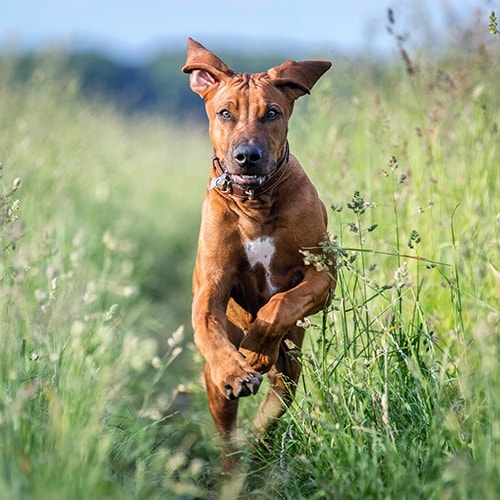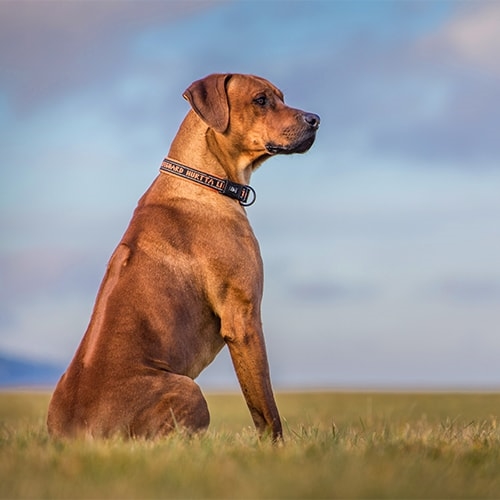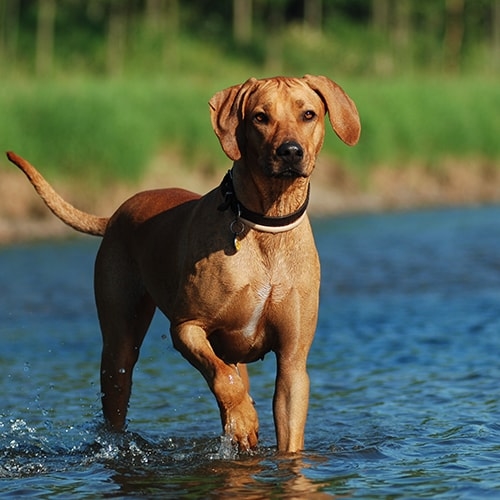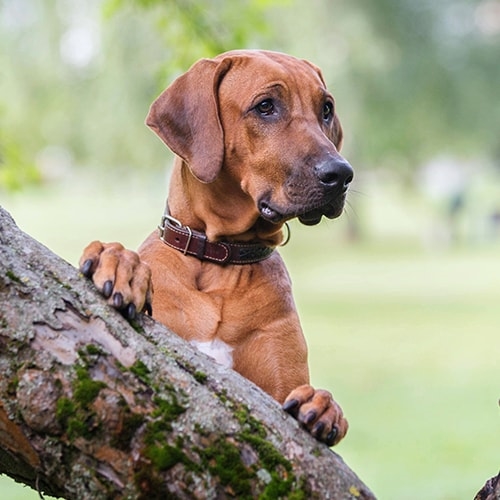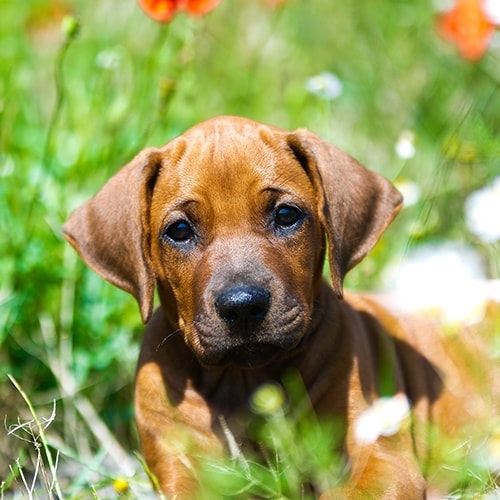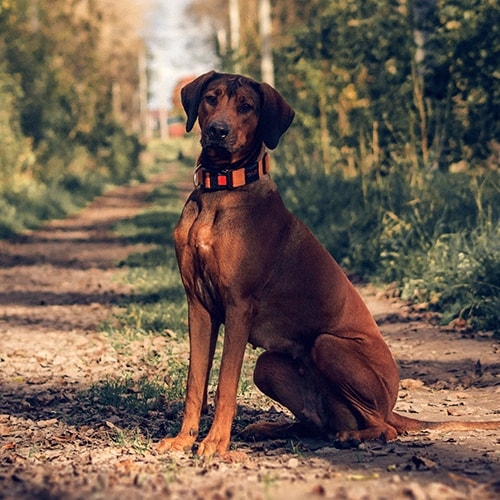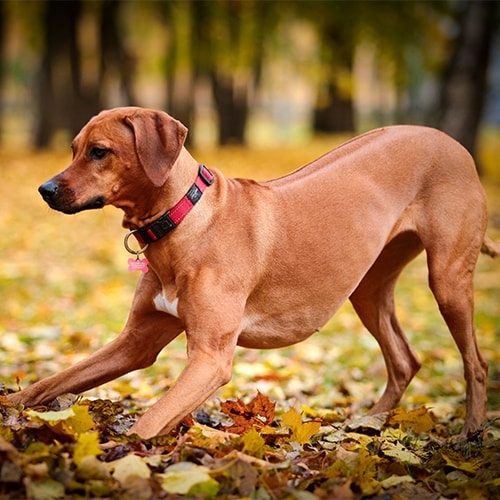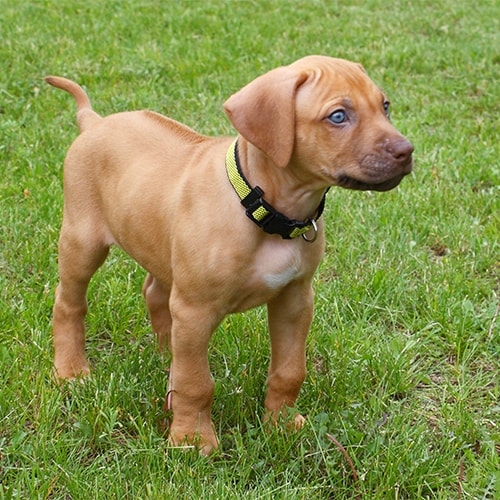| Size | Large |
|---|---|
| Average height | 61-69 cm |
| Average weight | 31-38 kg |
| Average lifespan | Over 10 years |
| Minimum exercise (per day) | 2 hours |
| Coat length | Short |
| Minimum cost (per month) | £105 |
Rhodesian Ridgebacks are clever and gentle dogs who are loyal and protective of their owners and families. They’re known for the distinct ridge down their backs and are very active dogs who need plenty of exercise.
As they are such clever dogs, Rhodesian Ridgebacks need lots to keep them occupied as they get bored so easily. They are perfect for experienced owners who are used to training such intelligent dogs and a large garden is an absolute must.
Common health problems in Rhodesian Ridgebacks
Rhodesian Ridgebacks are playful and powerful dogs who are extremely loyal and loving towards their family. Sadly like so many other purebred dogs, they are prone to certain health conditions.
If you are thinking of buying a Rhodesian Ridgeback puppy, make sure the parents of your puppy have had the relevant health screening to reduce the chances of your puppy being affected by certain conditions. We’d recommend looking for a Kennel Club Assured Breeder as they meet extra requirements which will benefit your puppy’s health.
Some of the conditions Rhodesian Ridgebacks may develop include:
- Hip dysplasia – where the hip joint doesn’t fit together perfectly, which will eventually lead to arthritis. Before breeding, dogs should be screened by x-rays through the BVA/Kennel Club Hip Dysplasia Scheme.
- Elbow dysplasia – where the elbow joint doesn’t fit together perfectly, which will eventually lead to arthritis. Before breeding, dogs should be screened by x-rays through the BVA/Kennel Club Elbow Dysplasia Scheme.
- Gastric Dilatation Volvulus (GDV) – where a dog’s stomach bloats and twists around on itself, which can be fatal.
- Hypothyroidism – an underactive thyroid, causing problems with weight, skin and energy levels.
- Certain cancers.
- Dermoid sinus – a painful condition where the skin on the back links to the spinal cord. Puppies should be assessed by a vet prior to sale for this condition.
- Juvenile Myoclonic Epilepsy – a form of epilepsy. Parents should be DNA tested prior to mating. There is testing available for this.
If you want to minimise the risk of your dog getting problems, you can read our advice on choosing a pedigree dog.
Caring for your Rhodesian Ridgeback
Ridgebacks are strong and impressive looking dogs. While they can be unsure of strangers, once they get to know you they are real softies at heart. As puppies, they are very boisterous and playful despite their large size which is why they are better suited to experienced owners.
They have such high exercise needs that Ridgebacks are much better suited to an environment where they’ll get lots of access to open spaces where they can run and play and a home that can accommodate their bigger size.
Rhodesian Ridgebacks and barking
As with any dog, your Ridgeback is likely to make noise and this will be down to their training and individual personality. Many owners report that they are not excessive barkers and are only likely to bark if they are bored or to alert you of a new person at the door. If you’re having problems with excessive noise or barking, we recommend seeking the advice of an accredited behaviourist.
Training and socialisation
Ridgebacks are very intelligent dogs so respond well to positive, reward-based training from an early age. They can be wilful at times and are known to get bored easily if they’re not challenged enough, so it’s for this reason we wouldn’t recommend them if you are a first time owner.
It’s important to set clear boundaries for your Ridgeback and everyone in the household will need to keep to these. As with every dog, consistency is key! You’ll need to be very patient and take things slowly at first, but if you put in the time and effort your Ridgeback will grow into a lovely, well-behaved dog. If you need any extra help with training, we’d recommend taking your dog to accredited training classes.
Ridgebacks are natural watchdogs so they can be wary of people they don’t know. It’s important to socialise them from a young age with different people, dogs and experiences to help them grow into happy, confident adults.
We would never recommend leaving your Rhodesian Ridgeback alone for more than four hours. Because they form such strong ties with their families, you’ll need to gradually train them that it is OK to be alone. If left for too long too soon, your Ridgeback is likely to develop separation anxiety and might bark or chew things around the home.
Exercise
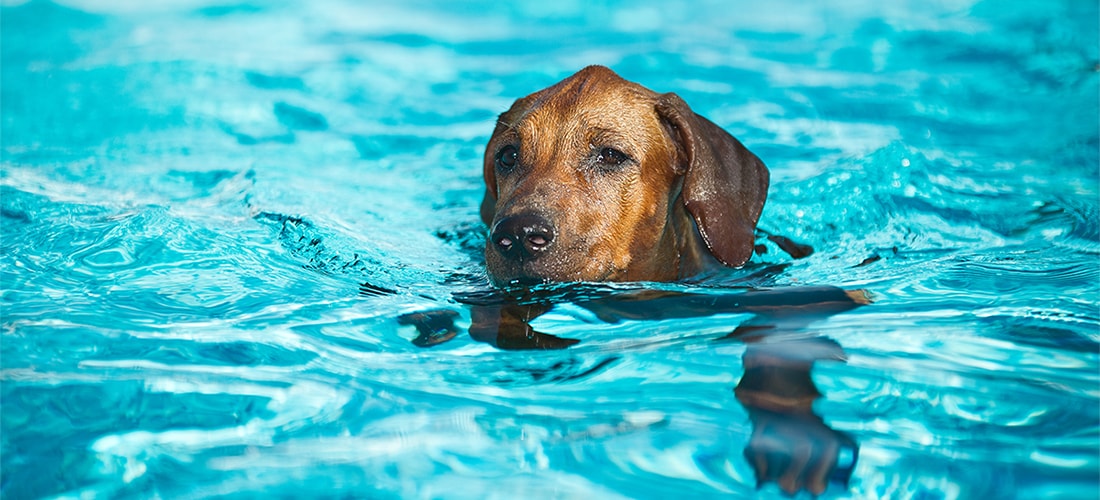
Rhodesian Ridgebacks are very high energy dogs which lasts well into their adult years so they need a lot of hard exercise to let off steam. They suit active families who are prepared to spend lots of time outdoors with them, rain or shine.
Your Ridgeback will need a minimum of two hours exercise every day. This needs to be several long walks with plenty of off-lead exercise in a secure place. On top of this, you’ll also need to do lots with your Rhodesian Ridgeback to keep their brain active. This can be a combination of training, playtime and challenging puzzle games. They have an extremely good sense of smell so will love to play scent games in the garden or around the house.
Ridgebacks tend to like water and may enjoy the occasional swim in summer. Remember to follow our water safety advice if you take your dog swimming
Grooming
Thanks to their short fur, Rhodesian Ridgebacks are pretty low maintenance when it comes to grooming. A weekly brush should be more than enough to keep on top of dead hairs.
Ridgebacks shed all year round and more so in spring and autumn when you may want to brush them a little more. As long as you keep on top of the hoovering you shouldn’t really notice it too much. You can visit our blog for tips on keeping your home (mostly) free from pet hair.
Rhodesian Ridgebacks and children
Rhodesian Ridgebacks can be calm and gentle dogs with the right training and love being part of the family environment. They best suit couples or families with older children who understand how to behave around dogs. Their large size and boisterous nature when they are younger also means they risk knocking over smaller children.
Remember to make sure you can recognise your dog’s body language so you can put a stop to any potentially stressful situations before they escalate. Always supervise your dog with children and vulnerable adults.
Rhodesian Ridgebacks and other pets
As long as your dog has been socialised with a variety of other dogs from a young age, they should get along with them fine. They may be a little unsure of other dogs at first but are usually fine once they’ve had a little time to suss them out.
Ridgebacks have a very high prey drive, so we wouldn’t recommend keeping them with smaller pets as they are likely to want to chase them! They may get along with a cat they have grown up with, but you should always supervise your dog with other pets.
Food
Your Rhodesian Ridgeback’s diet will vary depending on their age. You’ll need to feed them a complete, balanced dog food to keep them slim and healthy.
Your vet will be able to tell you how much your Rhodesian Ridgeback should be eating. You should feed them a good quality, commercially available, complete dog food. We usually recommend splitting their daily allowance into two meals. If you give your dog the occasional treat or use treats for training, remember to take this into account and reduce their daily allowance. Treats shouldn’t make up more than 10% of their daily calorie intake as this can unbalance their diet.
Try to feed your dog at similar times every day as they like routine. Remember to leave a gap between eating and exercising as this is thought to reduce the risk of GDV.
The cost of owning a Rhodesian Ridgeback
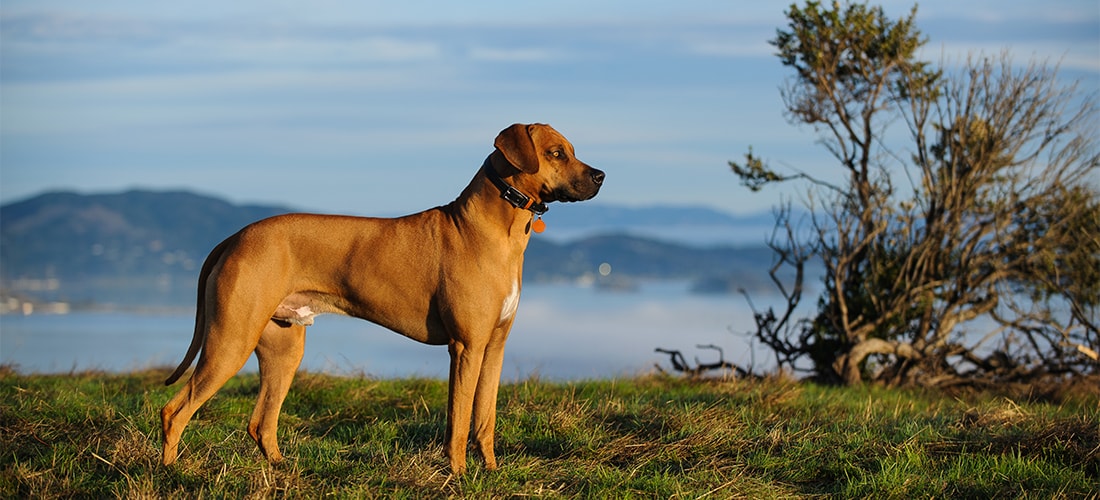
You can expect your Rhodesian Ridgeback to cost you a minimum of £105 per month after purchase and set-up costs and over £17,000 across their lifetime.
Costs you’ll need to think about include:
Purchase costs
Adopting an adult Rhodesian Ridgeback from a rescue centre may be a more cost-effective option, with the added advantage of giving a home to a pet without one – check if the rehoming centre you’re looking at asks for a donation for rehoming.
If instead you’re buying a Rhodesian Ridgeback puppy from a breeder, you’ll need to factor in this cost. Beware unusually cheap puppies as they could come from a puppy farm. If you’d like to buy a pedigree puppy, we recommend looking for a Kennel Club Assured breeder. These breeders must do extra health tests and meet higher standards.
Set-up costs
- Puppy vaccines – if you rescue a dog, reputable centres will often vaccinate them for you. Remember that ongoing booster vaccinations will be needed to continue their immunity.
- Neutering – you should usually arrange for your dog to be neutered at around 6-12 months old, though your vet will be able to advise you exactly when is best. Check prices at your local practice as these will depend on your vet and where you live. Some rescue centres will neuter any dogs they rehome, saving you this cost.
- Equipment – including a collar and tags, lead, harness, dog beds, dog bowls, pet-safe toothpaste and toothbrushes, grooming brushes and toys. Keep in mind that all these will need to be replaced with wear or damage or if your dog outgrows or damages them!
Ongoing costs
- Food.
- Preventive healthcare – budget for routine vet visits to help stop your dog getting ill and catch any problems early. They need annual check-ups, vaccinations and regular flea and worming treatments. Check if your vet offers a health care plan as this can help spread the cost throughout the year.
- Vet bills* or pet insurance – if you don’t have pet insurance and your dog needs veterinary treatment for an injury or illness, costs can rapidly mount up. Check what’s covered and what isn’t when comparing policies.
- Accessories – including lots of poo bags, replacing worn toys and grooming accessories, buying doggy toothpaste and any other extras they might need.
Other costs
- Training – basic training is very important and dogs can benefit from formal classes. Some dogs may have, or develop, behavioural problems which might need professional management.
- Boarding – you may also need to budget for boarding or dog sitting costs if you are planning to go away from home on holiday.
- Dog walkers/day-care – you might consider a professional dog walker to keep your dog happy and healthy if you’re unable to get out with your dog enough yourself, or to look after them during the day if you need to be out for more than four hours.
* It’s always better to plan ahead and budget or get pet insurance in case your pet gets injured or unwell. If you are having difficulty with veterinary costs, you can check if you are eligible for treatment at PDSA here.
If you’re considering pet insurance, our PDSA Pet Insurance could be a great option for you and it’s quick and easy to get a quote online.
Fun facts
- Although they’re known for the ‘ridge’ down their back (where they get their name from), not all Rhodesian Ridgebacks actually have this ridge.
- They were originally bred for tracking some pretty large animals, mainly lions.
- Rhodesian Ridgebacks are also known as African Lion Hounds.
- Not only are they skilled hunters, but Rhodesian Ridgebacks also make great guard dogs. You might find they are always on alert at home and let you know of all the comings and goings.
Getting a Rhodesian Ridgeback
Do plenty of research before getting a Rhodesian Ridgeback. These strong and active dogs are real softies at heart and will show their owners a lot of love and affection. If you have the time and space for their high exercise needs they could be the perfect dog for you.
Rehoming centres
There are plenty of rescue centres across the country where you may find a Rhodesian Ridgeback. Breed-specific rescues that specialise in Rhodesian Ridgebacks are also out there. You’ll need to ask any rescue centre about the dog’s history to make sure they will be comfortable in your home. Good rescue centres should let you know of any health and behaviour problems.
Breeders
If you buy from a breeder, make sure your puppy will be well socialised and have all necessary screening tests, health checks and vaccinations. It’s really important that Rhodesian Ridgeback puppies from a breeder get the right early socialisation so always ask the breeder about how they go about this. We recommend looking for a Kennel Club Assured breeder as they meet higher standards. We’ve put together some advice to help you find a good breeder.

